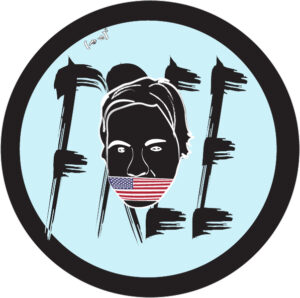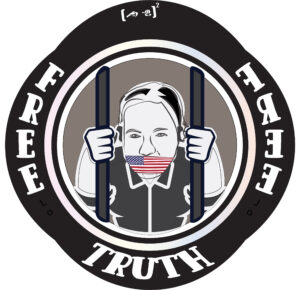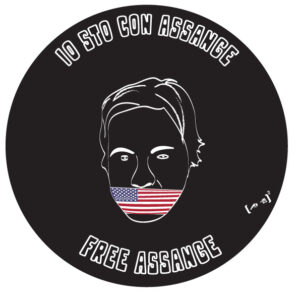By Ambra Visentin
Stella Assange recounts the long struggle to free her husband. A case of persecution by the US with the complicity of the UK. ‘If we allow extradition, we agree to lose the right to the truth’.
How is Julian Assange now?
The last three weeks have been made more difficult by the decision of a single High Court judge to refuse permission to appeal. Julian has made a new application to a different panel of judges but there is now only one obstacle to extradition. We found out about this about three weeks ago and then a week later a good friend of his, Daniel Ellsberg, passed away. He was the whistleblower who leaked the Pentagon Papers about the Vietnam War in 1971. Julian has been in Belmarsh prison for over four years, so his physical health is deteriorating every day. Mentally he is a very strong person, a fighter, but he is a human being and he is in a very difficult situation.
What are the conditions of his detention in Belmarsh prison?
It’s extremely restrictive. Prisoners are kept in their cells most of the time, except for visits or meetings with their lawyers. Belmarsh is not a long-term prison, except for Julian. He is the person who has been in his wing the longest. Normally people stay there while their trial is going on and then they are sent to another prison or they are released. But in his case it’s just indefinite. He has been there for 4 years and 3 months and counting.
What can you talk about when you go there? Can you talk freely about his situation and what is going on in the world?
Not freely, because it is not a private visit at all. It is a big visitation hall with about 40 tables and about 100 other people there, including prisoners, visitors and guards. There are cameras everywhere. It’s very regimented, you have to sit at your table and you can’t just get up and walk around or go to the window. But even with these restrictions, there is plenty to talk about. It’s about an hour and a half when there’s a kind of normality and you can talk about mundane things or what’s in the news. Sometimes the conversations are more intellectual or political, but a lot of the time it’s about keeping him connected to the world. I tell him about the children and what’s happening at school, and they sing him songs they’re learning. That is the sweet part of these visits.
So far, who has been by your side? We recently heard Lula da Silva’s statement when he asked for Julian’s release.
It was quite a revelation. There were some very old, invaluable friends. They have been working quietly behind the scenes. It is certainly true that in terms of the public outcry, the people you would expect and who should have been at the forefront have not been. With some exceptions. Daniel Ellsberg, for example, was this enormously respected figure in the United States, and he was a great defender from day one. He testified at the extradition hearing. He was one of the highlights. There were people in the music and entertainment industry, like the footballer Eric Cantona, or actors like Tim Robbins, Pamela Anderson and Susan Sarandon, who were very supportive and weren’t afraid to speak out.
What about the media partners?
The original partners were quite slow to talk: Le Monde, El Pais, The New York Times, The Guardian and Der Spiegel. Now they have issued a statement, in November last year, saying that the case should be dropped and he should be released. But this was already the case four years ago, when he was arrested, or even before, when the authorities treated him as an exceptional case and kept him in a state of permanent legal uncertainty. While he was in the embassy, he was not allowed to leave without being arrested. At the same time, the countries involved refused to guarantee that he wouldn’t be sent to the United States. For nine years there was no charge and yet he was treated not only as a suspect but as if he were guilty and then, once he was arrested, the pretext for keeping him in custody, the Swedish investigation, was dropped. Then the true face of the persecution was revealed in all its strength.
How do you explain this late reaction?
There was a specific personality and journalistic jealousies involved. So the people who collaborated, once they had what they needed, which was the actual material, they didn’t see any incentive to defend Julian, because they disputed what Julian was doing with Wikileaks as a professional rival to what they were doing. It came at a time when these newspapers had a great reputation, but they were also going through a huge financial crisis and they didn’t know how they were going to survive. And then Julian came along with a worldwide reputation because of the quality of the publications and their importance. So they were sort of forced to work together because it was much bigger than anything they had done individually. When the legal system silenced and imprisoned him, their rival was in legal trouble and they could just turn away.
That is a psychological explanation. Is there more?
It is undeniable that they failed to report critically on what was happening. They denied their audience, their readers, a proper analysis and explanation of what was done to Julian. And you know this because there was an independent United Nations investigation into the whole period he was in the embassy. The UN Working Group on Arbitrary Detention looked at the case for fourteen months and came to the conclusion that the US and the UK had colluded to deny him his basic rights and were in breach of international law. Even when this decision was made, it was ignored by the press. It was like an active attempt to bury their heads in the sand and deny reality. At some point that becomes negligence. And when you start admitting it, you admit that you failed to do something and that you were wrong along the way.
Things have changed over the years. The experts in the field – Amnesty International, the press freedom groups, Humans Rights Watch and even the Council of Europe – have made it clear that this is an enormous abuse. Now there is also political support. Last year, the European Parliament chose him as one of the three finalists for the Sakharov Prize.
Is what is happening to Julian Assange a warning to all journalists?
It’s clear that what’s being done to Julian is a message to everyone out there. It is a deterrent and it is so extreme that it is a deterrent not just to journalists and publishers but to everybody. Especially because the UK has gone along with it. He should never have spent a single day in jail. The fact that he did shows that there has been a catastrophic breakdown in the safeguards that are supposed to prevent this kind of lawfare. The effect of this is to reduce the scope of the right to information and public awareness of abusive authority. If there is abusive authority that is protected from scrutiny by secrecy, if you punish those who try to expose wrongdoing, those people will clash with the abusers and those who have committed the crimes under the authority of power. So what we have seen increasingly over the last decade is the use of lawfare. And that goes hand in hand with the increased powers of the state through anti-terrorism legislation, which is being used in cases that have nothing to do with terrorism.
Julian’s case is the most obvious case of lawfare because it has this completely absurd legal proposition where you say that someone who is in another country, who is not even your citizen, is violating your speech and secrecy laws. It means that orders and jurisprudence don’t matter, there’s just world power and it’s a form of intimidation.
We risk nuclear war. Is the attack on free information part of the government’s agenda?
It has always been the case when there is war. There is an extraordinary attempt to control the narrative. The difference now is that the places where we can communicate are not under our control. They are controlled by social media companies, which also have their own biases. For example, from what we have seen from the Twitter dump revelations, the Ukranian intelligence service made requests to the FBI to shut down accounts on Twitter, and the FBI passed those requests on to Twitter. One of the accounts was that of an award-winning American journalist. To Twitter’s credit, they didn’t shut it down, but this kind of thing happens and when you have the means to control the conversation, obviously those who have a huge interest in controlling that conversation are not going to restrain themselves. What has changed is that the public square is now online and that is not public.
How is the concept of fake news being used to silence opinions that differ from those of governments?
Since these new means of controlling discussion have been available, we have seen a proliferation of what some people call the censorship industrial complex. If all of a sudden there is an economy around controlling so-called fake news, what it allows is a cover for actually manipulating information, trying to control perception. There has to be a free flow of information for good information to prevail over bad information. But here you have the exact opposite. This is an authoritarian kind of instinct developed by those who have a lot to lose from democratic openness.
Images of the massacre in Bucha, Ukraine went around the world and Putin was declared a war criminal by The Hague, while Assange faces life imprisonment for exposing US war crimes. What does this mean?
These hypocrisies need to be pointed out all the time. Either we are universal about things like war crimes, or we are not. And if we are not, then we can throw out the whole system. This kind of exceptionalism has been around for a long time. Just look at the International Criminal Court, which the United States helped to set up and was very instrumental in creating, and then pulled out and are no longer under its jurisdiction. If you’re trying to set up a series of efforts to prosecute the worst crimes then you have to buy into it, you can’t just say “ok and this applies to the rest of the world”.
Why does the US government maintain the same line regardless of the party in power? Aren’t the Democrats in danger of losing credibility with their voters?
This is already happening. You only have to look at the major TV networks that used to attract the majority of TV viewers. They have been abandoned. People have voted with their feet and simply gone elsewhere. At the same time, you have seen a very interesting alternative media landscape develop. Some of the biggest names in those very publications have set up their own channels to communicate directly with their readers and their audiences, and it’s going very well for them. In terms of educating the readership, I think it is improving and growing. In terms of the administration, this case against Julian is extremely controversial. There has never been a uniform attitude towards it. And that’s partly because all the major newspapers have said it should be dropped. Even within the Justice Department, there have been prosecutors who have left the case because they disagreed with the charges. Under the Obama administration, Obama declined to prosecute. Of course the Trump administration agreed to prosecute, but that’s when the DOJ prosecutor left the case. As the New York Times says, “This is a case that strikes at the heart of the First Amendment”. There is a free speech crisis in the wider Western liberal democracies. Long-established protections for free speech are being eroded culturally, politically and even legally. There is a general danger of a real and permanent departure from these principles. I don’t think it’s happened yet, but it’s certainly a real risk.
What helps you find the motivation to keep fighting?
I meet people all the time. People who are decent. I have almost become spiritual about it. We have to believe in humanity. There are people who want to support Julian and us out of a basic sense of decency and justice, and I think that is fundamental, regardless of ideology and so on. The basic building blocks of human civilisation have to try to hold on to that and nurture that and find ways to overcome our differences by communicating and having some human kindness. Not to lose faith in the potential of people coming together and trying to change the world for the better.
Bio
Stella Assange is a human rights lawyer who was born in South Africa. She joined Assange’s legal team in 2011. In March 2022 she married Julian Assange with whom she has two children, born 2017 and 2019. She has described their lives being targeted by illegal surveillance, including during the latter stages of Assange’s political asylum in the Ecuadorean embassy, which she has described as ‘the most surveilled embassy in the world’ and a ‘type of prison’. Since his arrest in April 2019 Julian Assange has been kept under administrative detention in the UK’s most surveilled prisons, Belmarsh prison, also known as Britain’s Guantanamo, which the United States seeks his extradition to face 175 years for publishing documents exposing war crimes and civilian killings by US military personnel.
Free Assange
If you would like to support the Free Assange campaign, you can download one of these illustrations for free and use it as your profile picture on your social media pages.




The author of the illustrations
DoubleG is Abruzzese by birth, Bolognese by adoption, a graduate in humanities and a precarious worker. A lifelong avid reader of comics, in recent years he has been self-taught, creating and collaborating on comics and graphics on the independent circuit. He says of himself: “I enjoy drawing reality and current events as seen through the deforming lens of my irony”.

























